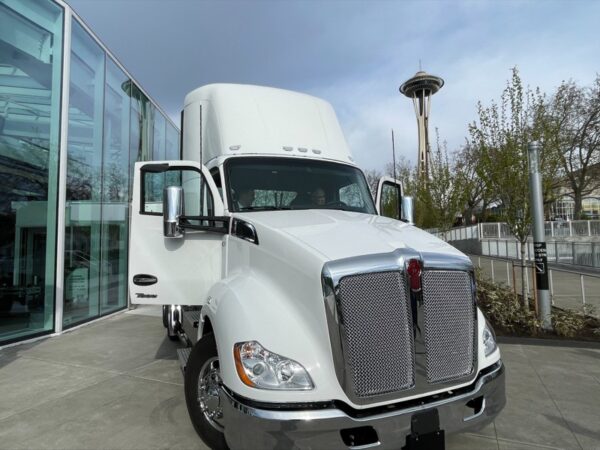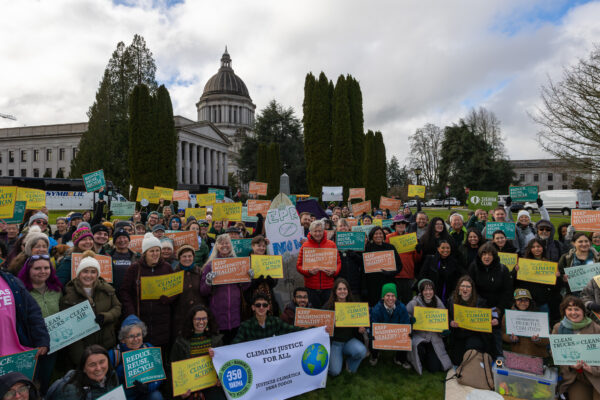In June 2023, Washington Conservation Action CEO Alyssa Macy was announced as one of the winners of the 2023 Ecotrust Indigenous Leadership Award. Washington Conservation Action is proud of Alyssa and her leadership. The Awardees will be celebrated on Wednesday, October 18, 2023, in Portland, OR.
WCA Board President, Ken Lederman shared his thoughts, “Thanks to Alyssa’s leadership over the past 4 years, WCA has made significant strides in protecting our natural environment while establishing stronger relationships with tribal communities, ensuring tribal sovereignty is represented in all aspects of our work, increasing protection for salmon, and supporting native leaders throughout the Northwest. Our boards and our staff feel confidence and pride in having Alyssa as our physical and spiritual leader on our journey towards protecting people and nature as one.”
The following is the write-up by Ecotrust on Alyssa’s leadership as CEO of WCA:
The old story goes like this. There are people, and there is nature, one in control of the other. Alyssa Macy tells another story, the Indigenous story, the one that majority culture forgot, she said. We are nature.
“If there is anyone in the Pacific Northwest who has been fighting for water, salmon, lands, it’s Indian people,” she said. “This is Indian Country. These are truly Native lands. The tribes here lead. I’d like to see what I can do to help tribal nations continue to advance strong environmental protections.”
As director for Washington Conservation Action (WCA), this vision fuels her work to organize, negotiate, and collaborate to protect the environment while safeguarding tribal sovereignty and treaty rights.
“I like to do hard things,” she said, laughing, describing her “crazy idea” to indigenize WCA by focusing on the relationships to the natural world that are central to Indigenous people and salmon. Salmon are a multimillion-dollar industry in the Pacific Northwest, she said, but for Indigenous people, they are necessary for survival, providing nutrients to every part of nature — the ground, water, trees — to us.
Macy is honored with a 2023 Indigenous Leadership Award for her efforts to build strong Indigenous government-to-government relationships, advocating for salmon protection, and her leadership in Washington state’s environmental community. She has earned a reputation as a tenacious and committed leader who builds strong alliances between sovereign tribal nations and environmental conservation groups.
WCA is Washington state’s largest and most powerful environmental organization. It is the only environmental nonprofit in the state to combine advocacy for both policy and politics and a PAC to support environmental organizing, the combination of the Washington Environmental Council and Washington Conservation Voters.
In 2023, under Macy’s leadership, WCA was instrumental in guiding the effort to pass the Climate Commitment Act (CCA) into law, the strongest carbon pricing policy in the U.S. CCA will cap and reduce climate pollution and create revenue for climate investments intended to accelerate the transition to a clean energy infrastructure and economy.
As the first Indigenous leader of WCA in its 56-year history, Macy has also committed the nonprofit to the long-term and difficult work of supporting the removal of four dams from the lower Snake River to save salmon in the Snake and Columbia Rivers. It will be one of the biggest fights for WCA in the years to come.
Macy, a citizen of the Confederated of Warm Springs Tribes and the former Chief Operating Officer for the Tribe, has been deeply involved in social justice, grassroots community organizing, and running political campaigns much of her life. Her foundational work began with the International Indian Treaty Council in 2003, an international nonprofit affiliated with the United Nations and born out of the American Indian Movement that works to recognize and protect Indigenous rights, treaties, traditional cultures, and sacred lands. Elevating tribal nations to nation state status is a value that underpins everything she does.
“This was the thing that fed me. It was always about treaties,” she said. That, and her father’s words: We are a treaty tribe. We have rights under international standards. You should always be prepared for the rest of your life to fight for them.
Macy’s path has not been straight, even if it seems like she was nearly born into organizing on behalf of Indigenous people.
“I am an AIM baby,” she said. Her parents met as activists in the American Indian Movement (AIM). She grew up with her father, a Warm Springs tribal member, sharing a deep appreciation of the natural world. He died when she was a senior in high school, she said.
“Like many Native people,” Macy said, “[My parents] had a lot of challenges that they were trying to deal with in their lives. They were both smart, capable people, but they had their own demons. I grew up with my dad in central Oregon. Warm Springs can be a pretty hard place to grow up — it’s rural, it’s poor, there is lots of racism and, in some cases, not a lot of opportunity, not a lot of hope.”
By the time she was 16, she was on her own. Once she graduated from high school, she left her reservation. From then on, she said, “I never felt I had anything to lose. If I failed, there was no one to catch me.”
Macy was awarded a four-year scholarship from the Warm Springs Tribe, earned a degree at Arizona State University, followed by a year-long Hatfield Fellowship that sent her to Washington, D.C., for a year. She went on to graduate school at the University of Minnesota and began to work in jobs focused on movement building and creating change in community, including nonpartisan civic engagement work, National Congress of American Indian’s National Native Vote effort and as a tribal liaison for the Wisconsin Department of Transportation.
“How did this little kid from the rez end up in all these remarkable places? I definitely did not sign up to be a role model,” she said. “The likelihood that I would succeed [was greatly diminished] based on what I was born into and experienced, where I was raised. I had to learn I was worthy of love and capable, that I was a person of value. It took a long time to get there.”
In 2013, after 20 years away, she moved back to Warm Springs “to reconnect with who I was. I needed to be grounded in my own community if I wanted to continue to work advocating for Native people and treaty rights, ensuring that the federal government upholds its trust responsibilities to tribes. It was important to reconnect with my roots.”
She was appointed Chief Operations Officer for her Tribe. “I grew up in a part of the world that is so beautiful. Going home was the best thing I could have done.” In 2020, just when the pandemic emerged, she was offered the job as WCA director.
Macy, who lives on Lummi Nation with her significant other, Dana Wilson, was diagnosed in 2022 with “aggressive, turbo-charged breast cancer.” The disease, in remission for the past four months, has forced her to slow down, making her a better leader in the process, she said.
“I’m vulnerable in a way I’ve never been. It teaches you a lot about yourself and what it means to work with love.”
At the end of the day, Macy said, “Everything goes back to salmon. I want to see that salmon is always here. That means that my people and tribal people in the Northwest region will always be here. It’s a way to survive.”



